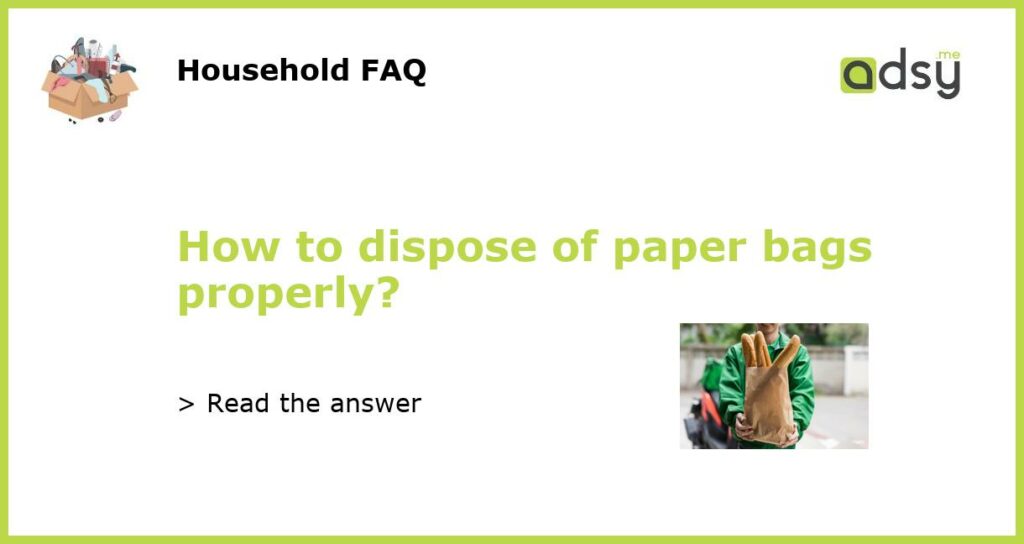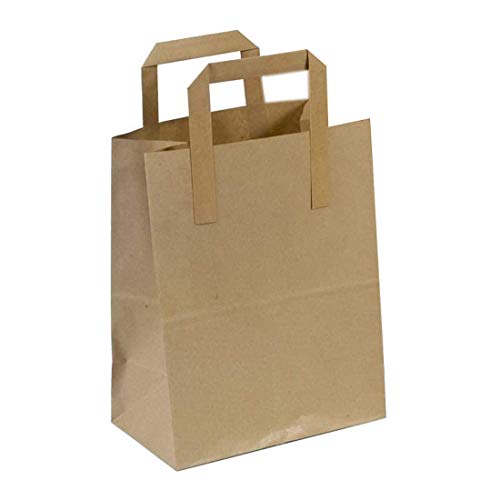Why is it important to dispose of paper bags properly?
Paper bags are a popular choice for carrying groceries, shopping items, and other goods. They are commonly used because they are biodegradable and recyclable, making them a more environmentally friendly option compared to plastic bags. However, it is essential to dispose of paper bags properly to maximize their positive impact on the environment.
When paper bags are disposed of correctly, they can be recycled and used to create new paper products. Recycling paper bags helps save trees, reduce energy consumption, and minimize water pollution associated with the production of new paper. Additionally, properly disposed of paper bags decompose efficiently, returning nutrients back into the soil without causing harm to the environment.
On the other hand, improper disposal of paper bags can lead to various negative consequences. When paper bags are thrown away as trash and end up in landfills, they take up space and contribute to the growing waste problem. Moreover, when paper bags are littered, they can clog storm drains, pollute waterways, harm wildlife, and contribute to the overall deterioration of our ecosystems.
Ways to dispose of paper bags properly
1. Recycling: The most environmentally friendly way to dispose of paper bags is through recycling. Before disposing of them, check if your local recycling facility accepts paper bags. If they do, make sure to remove any handles or adhesive labels as they may not be recyclable. Flatten the bags to save space and place them in the designated recycling bin or take them to a recycling drop-off location.
2. Reuse: Another option for disposing of paper bags is to reuse them. Paper bags can serve multiple purposes, such as temporary storage for items, gift bags, or even as craft materials. By reusing paper bags, you extend their lifespan and reduce the need for new ones.
3. Composting: If you have a composting system, consider adding paper bags to it. Paper bags, especially those made with organic materials, can break down alongside other compostable waste and contribute to nutrient-rich soil for gardening or landscaping purposes. However, it is important to ensure that the paper bags are free from any non-compostable materials, such as plastic linings or handles.
4. Donate: If you have paper bags in good condition that you no longer need, consider donating them. Local food banks, community centers, or other organizations may find them useful for distributing groceries or other items. Donating paper bags helps extend their usefulness and reduce waste.
5. Check with local regulations: Each locality may have different rules and regulations for proper disposal of paper bags. It is important to stay informed about the guidelines and recommendations provided by your local waste management authorities. By following these guidelines, you can ensure that your paper bags are disposed of in the most appropriate and environmentally friendly way.
The benefits of proper paper bag disposal
Properly disposing of paper bags has several benefits for the environment and society as a whole. By recycling paper bags, fewer trees need to be harvested, reducing deforestation and conserving natural habitats. Recycling also saves energy and water, as the production of paper from recycled materials requires less energy consumption and water usage compared to manufacturing paper from raw materials.
When paper bags are composted, they contribute to the creation of nutrient-rich soil, reducing the need for chemical fertilizers and promoting sustainable agriculture. Composting paper bags also diverts organic waste from landfills, minimizing greenhouse gas emissions and odors associated with decomposing organic matter.
Proper paper bag disposal also helps keep our communities clean and free from litter. When paper bags are not disposed of properly and end up as litter, they can be unsightly, create health hazards, and harm wildlife. By disposing of paper bags correctly, we contribute to a cleaner and healthier environment.
Spreading awareness about proper paper bag disposal
To encourage proper paper bag disposal, it is important to spread awareness and educate others about the benefits and methods of appropriate disposal. Here are some ways to do so:
1. Social media campaigns: Utilize social media platforms to share information and tips on how to dispose of paper bags properly. Create engaging posts, infographics, or videos that highlight the environmental impact of proper disposal and provide step-by-step instructions.
2. Community events: Organize or participate in community events dedicated to waste management and recycling. Set up booths or workshops where people can learn about proper paper bag disposal and other sustainability practices.
3. School programs: Collaborate with schools to incorporate waste management and recycling education into their curriculum. Teach students the importance of proper paper bag disposal and involve them in practical activities, such as conducting recycling drives or composting projects.
4. Collaborate with local businesses: Partner with local businesses to promote proper paper bag disposal. Provide them with educational materials or assistance in setting up recycling programs within their establishments.
5. Government initiatives: Advocate for stricter regulations and policies regarding waste management and recycling. Encourage local authorities to provide accessible recycling facilities and support community programs focused on proper paper bag disposal.
Conclusion
Proper disposal of paper bags is crucial for preserving the environment, conserving resources, and minimizing waste. By recycling, reusing, composting, or donating paper bags, we can make a positive impact on the planet and create a cleaner, more sustainable future. It is essential to spread awareness and educate others about the importance and methods of proper paper bag disposal to encourage responsible behavior and protect our environment for generations to come.






